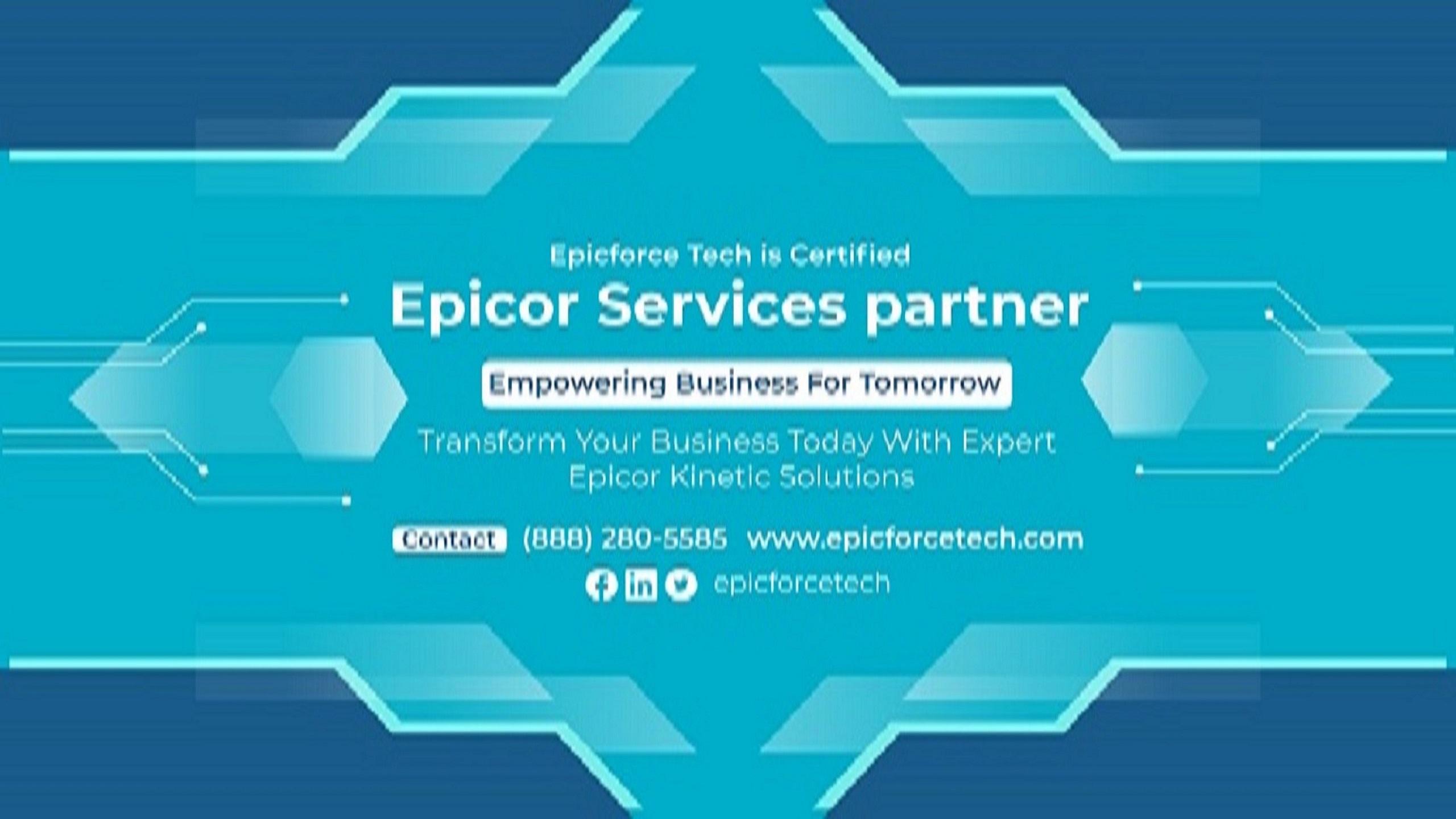How Epicor Consultants Streamline MRP for Manufacturers: A Step-by-Step Breakdown

In today’s manufacturing environment, efficient production planning is critical to staying competitive. Yet many businesses face hurdles with their Material Requirements Planning (MRP) processes—misaligned inventory levels, inaccurate forecasts, delayed procurement, and underutilized capacity. That’s where Epicor consultants come in.
This guide, brought to you by Epicforce Tech, takes a step-by-step look at how experienced Epicor consultants help manufacturers streamline MRP processes inside Epicor ERP systems. From aligning business rules to optimizing system performance, the goal is simple: reduce waste, improve planning, and empower manufacturers to make faster, data-driven decisions.
Table of Contents
-
What Is MRP in Epicor?
-
Why MRP Often Underperforms
-
Role of Epicor Consultants in MRP Optimization
-
Step-by-Step Breakdown: How Consultants Streamline MRP
-
Key Benefits for Manufacturers
-
Common Missteps Consultants Help Avoid
-
Final Thoughts
1. What Is MRP in Epicor?
Material Requirements Planning (MRP) in Epicor ERP is a system-driven process that analyzes demand (from sales orders, forecasts, etc.) and matches it with supply (inventory, purchase orders, production schedules). It automatically generates job suggestions, purchase orders, and stock movements to ensure materials and components are available when needed—without overstocking or shortages.
Epicor’s MRP module is powerful, but to work efficiently, it requires properly configured settings, accurate data, and a clear understanding of your production processes.
2. Why MRP Often Underperforms
Many manufacturers adopt Epicor ERP expecting MRP to automate planning and reduce operational headaches. But without proper setup and oversight, MRP can generate poor results. Common issues include:
-
Overloaded or conflicting demand signals
-
Inaccurate part lead times
-
Improperly maintained bill of materials (BOM)
-
Forecasting errors
-
Poor system performance during MRP runs
These problems don’t stem from the software itself but from the lack of tailored configuration, poor master data quality, and missing business logic alignment. This is where Epicor consultants provide vital support.
3. Role of Epicor Consultants in MRP Optimization
Experienced Epicor consultants, like those at Epicforce Tech, don’t just “install and configure.” Their role is to bridge the gap between how MRP should work and how it functions in your specific environment.
Consultants provide:
-
Business process alignment: Ensuring MRP logic fits how your teams actually operate.
-
Data integrity checks: Fixing incorrect or incomplete data that skews MRP output.
-
Performance tuning: Reducing the time it takes to run MRP and improving its reliability.
-
Training and documentation: Enabling your teams to run, review, and act on MRP suggestions correctly.
4. Step-by-Step Breakdown: How Consultants Streamline MRP
Here’s how Epicor consultants typically approach an MRP optimization project:
Step 1: Assess Business Needs and Current MRP Usage
Consultants begin with a discovery phase to understand:
-
Production workflows
-
Inventory management strategy
-
Lead times and vendor reliability
-
Current Epicor MRP setup and pain points
This step identifies where MRP isn’t aligned with real-world operations.
Step 2: Evaluate Data Integrity
Even the best MRP engine fails with poor data. Consultants audit:
-
Part master records
-
BOM structures and revisions
-
Work center capacities
-
Lead times (purchase and production)
-
Inventory transactions and statuses
Corrections are made to eliminate bottlenecks caused by inaccurate data.
Step 3: Optimize MRP Parameters and Settings
Epicor allows for deep customization of MRP logic. Consultants tune:
-
MRP cutoff dates
-
Planning horizons
-
Safety stocks and reorder points
-
Lot-sizing rules (e.g., lot-for-lot, minimum order quantities)
-
Job firming and suggestion filters
Proper configuration ensures MRP output matches business expectations.
Step 4: Run Controlled MRP Tests
Before deploying changes system-wide, consultants perform:
-
Sandbox MRP simulations
-
Cross-functional walkthroughs of suggestions
-
Comparison with historical orders and performance
This validation ensures that the new setup is producing logical, actionable outputs.
Step 5: Train Staff and Build Standard Operating Procedures (SOPs)
Consultants work with planners, buyers, and production managers to:
-
Interpret MRP output confidently
-
Use filtering and pegging tools effectively
-
Make timely decisions based on suggestions
This step increases internal adoption and consistency.
Step 6: Monitor, Adjust, and Automate
After go-live, consultants from Epicforce Tech monitor system usage and:
-
Adjust MRP rules based on seasonal patterns or product changes
-
Automate routine responses (e.g., automatic job creation or PO approval)
-
Create dashboards and reports for long-term MRP tracking
MRP is not a one-time setup—it needs continuous refinement, which consultants help manage.
5. Key Benefits for Manufacturers
When Epicor MRP is fine-tuned by experts, the benefits are substantial:
-
Reduced stockouts and overstocks
-
More accurate job and PO generation
-
Better production scheduling
-
Improved on-time delivery rates
-
Stronger supplier coordination
-
More confident decision-making by planners
These outcomes lead to more efficient operations and stronger bottom-line performance.
6. Common Missteps Consultants Help Avoid
Manufacturers often unknowingly limit their MRP potential. Epicor consultants help teams avoid:
-
Treating MRP as a “set-and-forget” tool
-
Ignoring the importance of BOM accuracy
-
Running MRP on outdated data
-
Overriding MRP suggestions without root cause analysis
-
Failing to align purchasing and production goals
With guidance from experts at Epicforce Tech, these issues are proactively resolved.
7. Final Thoughts
Material Requirements Planning is the heart of a manufacturer’s ability to meet demand without excess. But without careful setup, alignment, and ongoing improvement, even a powerful system like Epicor ERP can fall short.
By partnering with skilled Epicor consultants, manufacturers gain clarity, control, and confidence in their planning processes. Whether you're a mid-sized shop or an enterprise-level producer, MRP can be a powerful engine for growth when configured with expertise.
At Epicforce Tech, we help you do more than run Epicor we help you run it well.






